Winter can be a harsh time for chickens and their owners. There are multiple things you need to be worried about during the cold temperatures.
You need to ensure your chicken’s health so as not to impact the egg production during the summer.
Can your chicken stay out during the cold winter months, or what temperature is too cold for them?
Chickens are built to survive in the cold. They prefer temperatures of 70 to 75 degrees Fahrenheit, but as long as they are healthy, they can survive in temperatures below freezing. Keep their coops warm and dry and feed the chickens a bit extra, and the healthy chickens will be okay in the cold.
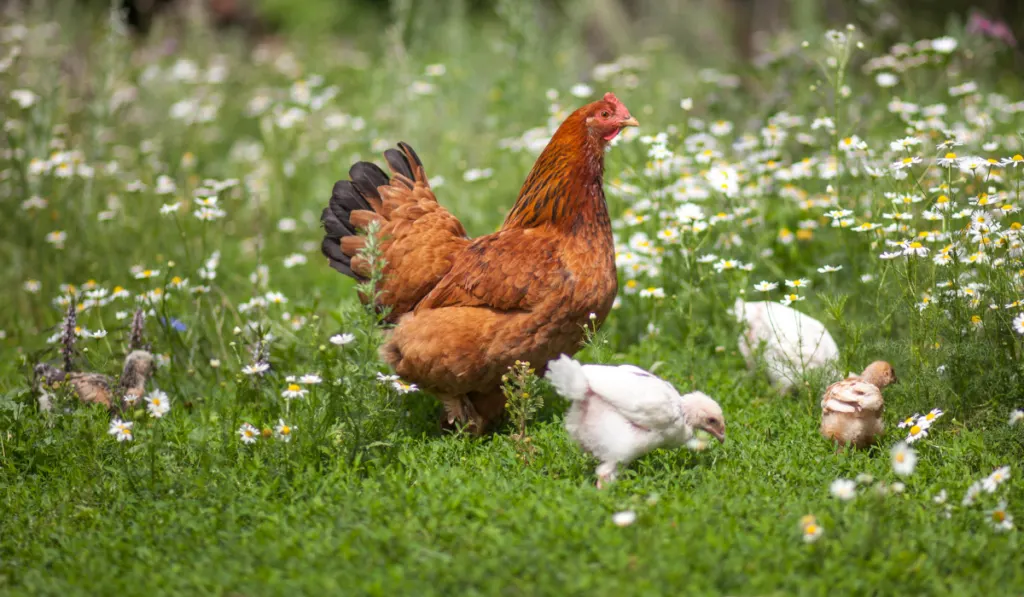
Cold weather can be a scary thing, especially for new chicken owners. Many thoughts race through your head, and one of them is the cold temperature itself.
Will your chickens be okay in the cold? How do you know when it is too cold for them? How do you protect your chickens? Let us find out.
Table of Contents
What Temperature Is Cold For Chickens?
Chickens are hardy creatures and can endure temperatures that are well below freezing. However, chickens do enjoy and prefer a warmer climate.
The perfect temperature for chickens is between seventy to seventy-five degrees Fahrenheit. Chickens can survive temperatures lower than this, but it will start to cause problems if the low temperatures are not addressed accordingly.
We all know that we can not provide the ideal temperatures at all times for our chickens, but we will need to take extra precautions in the colder months of the year to keep our chickens happy.
To ensure that the chickens are happy and producing, you need to keep them warm, but do not overdo this as the chickens do not like being too hot.
Temperatures that are too hot may lead to your chickens losing their appetite, which will result in poor egg quality and a decreased egg production in your hens.
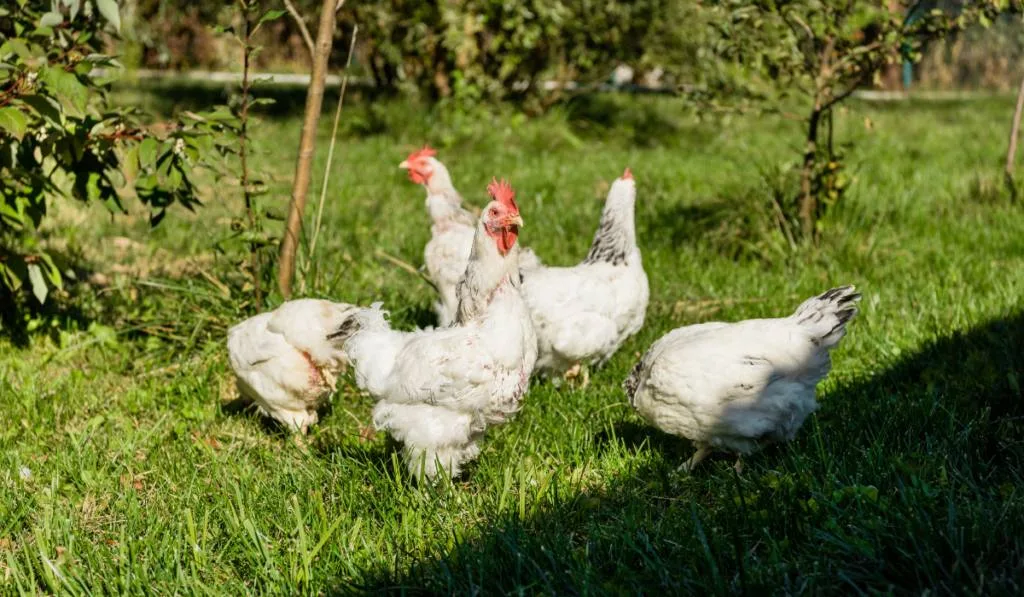
If your chickens get too cold, then this could also affect your hen’s egg production as it causes them to lay fewer eggs.
If your chickens do not have a warm, dry coop in the colder months, this can cause diseases to develop among your chickens, leading to the death of your chickens.
However, you do have some room to play with temperature-wise, as chickens have many different layers of feathers that can keep them warm in freezing conditions. These feathers keep air close to the chicken’s bodies. This air acts as insulation for the chickens.
Chickens also have a higher body temperature than humans. Their bodies usually keep a temperature of 105-109 degrees Fahrenheit.
When the chickens group together in their coup, their combined body temperatures can sustain a warm temperature in the coop that will keep the chickens happy.
So, if the temperatures are cold but not close to freezing, and your chickens are healthy, then you do not really need to add any extra heat to their coups.
If the temperature does fall close or below freezing or your chickens are not healthy, then you should add some safety precautions for your chickens.
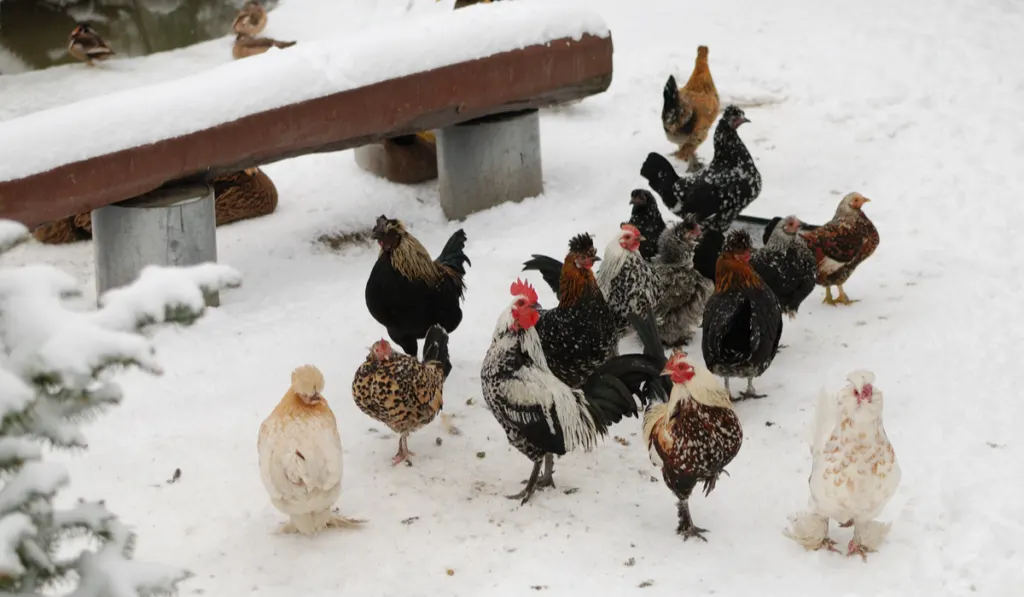
Can Chickens Freeze To Death?
If the temperature gets too low, then your chickens can freeze to death. This usually occurs when the chickens are not healthy, and you were not aware of this or if the chicken coop is not prepared properly for winter.
If your chickens are in a healthy condition and their coop is prepared correctly for the winter, then your chickens will not freeze to death just because of the low temperatures.
In fact, chickens can survive snowy, wet winters so long as their coop is properly insulated.
A good way to tell if chickens can survive in the cold in the area you live in is if you have wild birds flying around during the colder months, and the wild birds are active and healthy in the cold.
Healthy chickens should not have a problem in that location in cold weather either, as chickens have more protection due to the many layers of feathers they have compared to the wild birds.
If one of your chickens is not healthy due to an illness or injury, then you will need to take precautions to keep that chicken alive in the cold.
The best way to keep this chicken alive is to place the chicken in a crate or cage and place it in a warm room of your house or garage.
This will ensure that the unhealthy chicken’s body temperature does not drop to dangerous levels while recovering from the injury or illness.
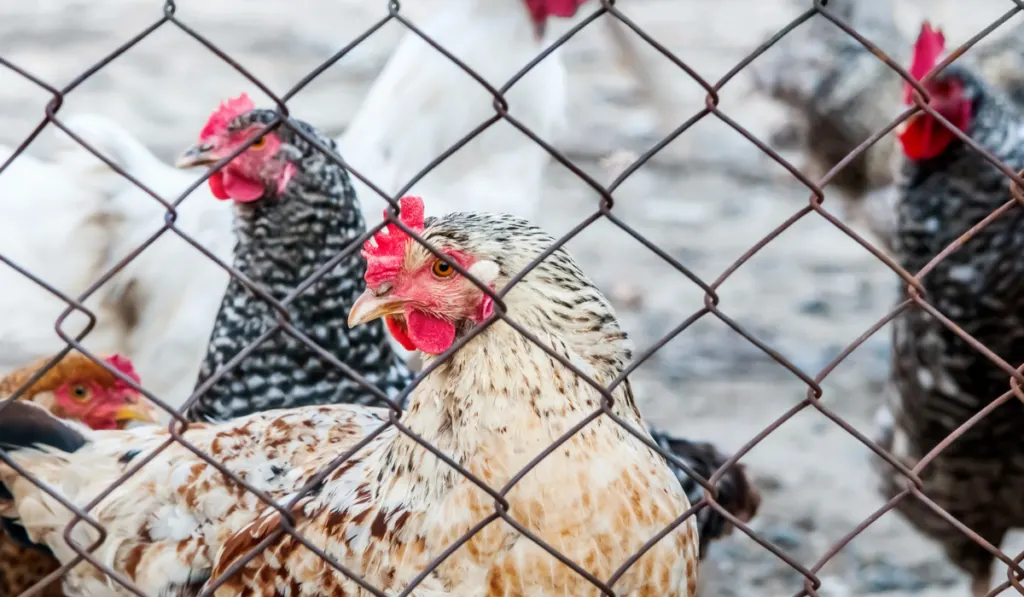
How To Tell If Your Chickens Are Feeling Too Cold
Chickens do get cold, though, but how do you tell if your chickens are feeling the cold and are getting stressed because of it?
Chickens that are feeling the cold will, like humans, look cold. They will be huddled up in a corner somewhere, and they will not move around much.
The chicken will probably be standing on one leg to keep one leg warm in its feathers, and they will swap their legs every so often, and its feathers will also be fluffed up.
If your chickens are showing these signs, then the weather may be too cold for them. You may need to provide shelter for them, including shelter during the day.
Should You Change Chickens Diets When It’s Cold?
Chickens will require more food during the winter to help them stay happy and healthy.
Hens usually take a break from laying eggs during the cold months of the year. This means that the hen’s diet will need to change from a high protein diet for producing eggs to a high carb diet to help keep them warm.
You should still continue to feed your chickens their usual layer feed, as this will still provide them with a well-balanced, nutritious diet.
You should supplement this feed with barley, corn, wheat, or rice to increase your chickens’ carb intake in the colder months of the year.
Increasing the amount of food you feed your chickens will also help them generate a steady internal temperature through the process of digestion. This will help aid in keeping the chickens warm.
You may also want to increase the number of treats you give your chickens in winter to help their calorie intake. Some winter treat ideas include warm oats, cracked corn, sprouted seeds, and mealworms.
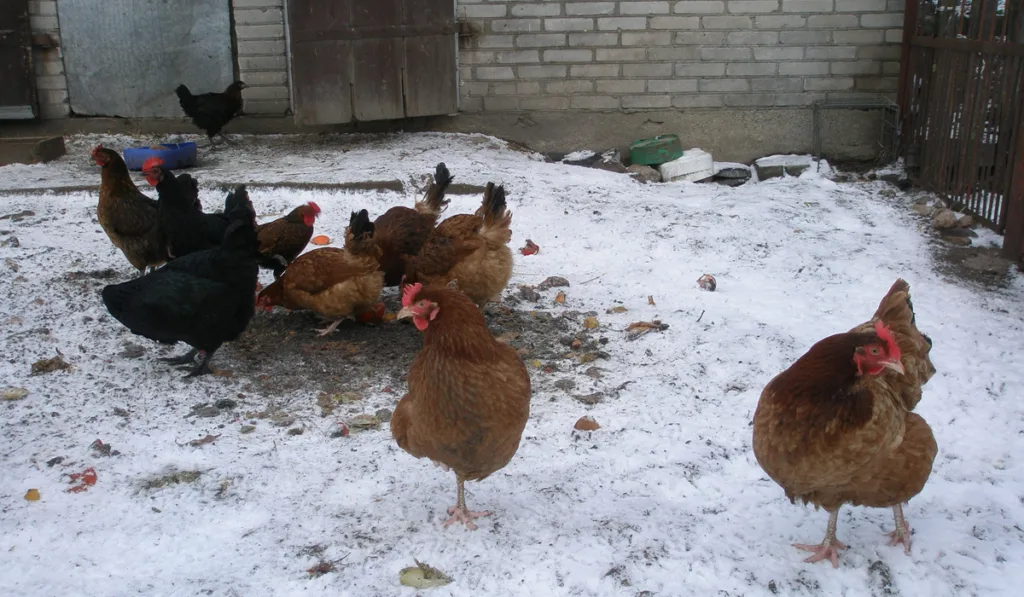
Type Of Bedding To Use For Chickens In The Cold
A good Bedding option for your chickens during the winter is hay/straw. Straw has a great heat retention rate, and it can be quite cheap.
You should add plenty of it into the chicken coop during the winter as this will help the chickens stay warm and cover some holes in the coop, which will decrease drafts.
You can also use a method that is known as the deep litter method to keep your chickens warm in the coup.
This method requires you to build up a layer of bedding on the coop floor and leave it there to compost for the winter. This helps the coop retain heat.
5 Tips for Getting Your Chicken Coop Ready for the Cold
You will want to make sure the coop has one or more of the following features in areas where there are prolonged periods of cold and snow:
1. Make Sure Your Roof is Watertight
To protect your chickens during winter, you should also ensure that their coop is in good repair.
You also need to check the coop walls and possibly floor for any holes that may allow water inside it that will wet the bedding and chickens.
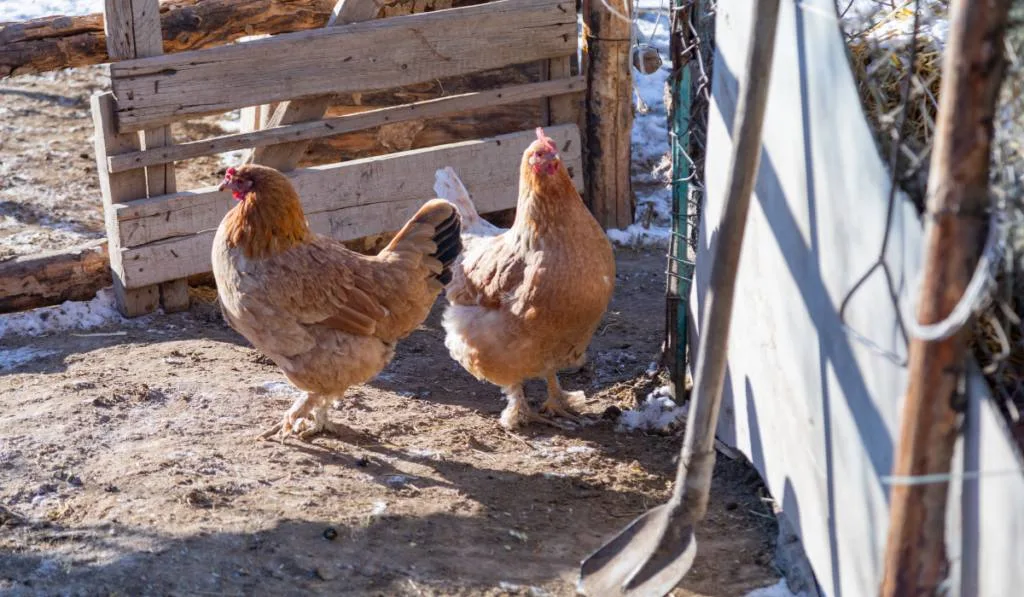
2. Adequate Ventilation
Ensure your coop have good ventilation to keep the coop dry and allow the ammonia smell from the chicken excretions to exit the coop.
You should not make the coop airtight, but you should also keep the coop safe from drafts.
3. Eliminate Drafts
Drafts are different from ventilation. Ventilation should promote airflow and, most commonly there will be vents towards the top of the coop to encourage exchange of air but, what you don’t want is cold drafts that blow freezing air onto your flock.
Check your coop for any air source that could allow air to directly blow on your chickens. The most common culprits are windows and large access doors.
If the coop has an opening that is the same height as the perches, you can place a shutter or another covering over this opening to control the amount of air moving through the coop and help stop cold drafts.
Windows should be closed or shuttered during extreme weather. If the wind is blowing wildly, then you can hang up some tarps around the coop to protect it from the wind.
4. Insulated Walls
In very cold regions it may make sense to actually insulate the walls of your chicken coop for added protection from the cold. This will help your coup retain heat as much as possible.
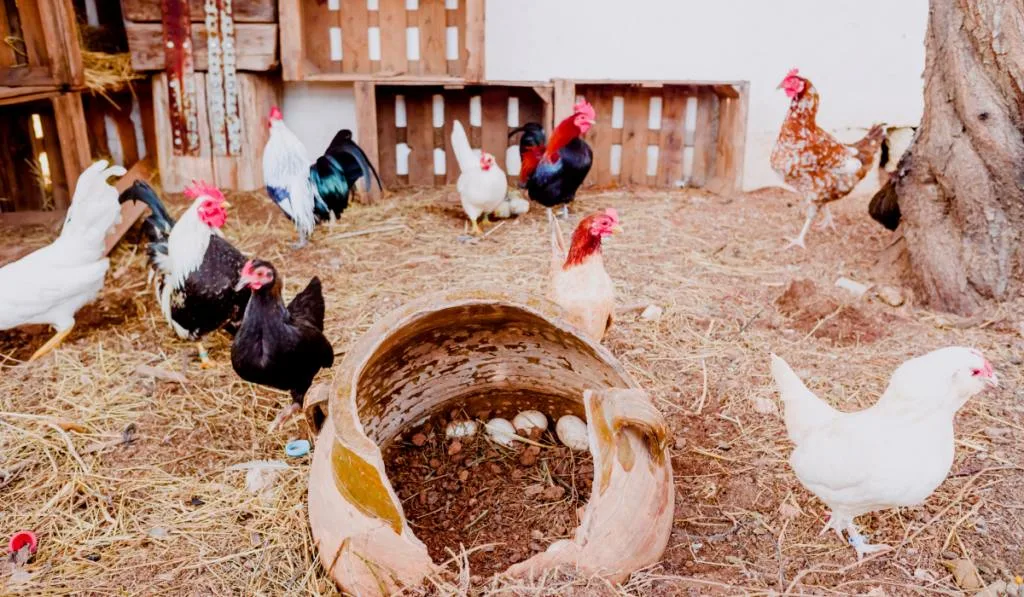
5. Freezeproof Water Source
The last thing you’ll want to do is make sure your chickens have liquid water to drink at all times. Chickens don’t need heated water in winter, they can drink it even if it is freezing cold but, it does need to be in liquid form.
A heated water source can ensure your chickens have water throughout the winter.
Some chicken waterers have built in heaters but you can also use a heated water base like the one below to use only during winter with your existing water containers.
- Controlled Heating: Heated base with thermostatically controlled operation ensures energy efficiency by activating heating only when temperatures drop below 35 degrees Fahrenheit
- Frost Prevention: Designed exclusively for use with all double-wall metal poultry founts, ensuring compatibility and seamless integration
- Compatibility: Powerful 125-watt heater prevents water from freezing down to an impressive 10 degrees Fahrenheit, providing reliable hydration for your birds in the coldest conditions
- Easy Maintenance: Bottom cover shields the heating element from debris, maintaining optimal functionality and extending the lifespan of the unit
- Versatile placement: Application in chicken coops, pens, and runs makes it an essential accessory for keeping your flock hydrated and healthy year-round
Other methods of keeping water from freezing include placing tires around the water bucket to help insulate it and using a water bottle filled with salt water (which floats and freezes at a lower temperature) to bob in the bucket and keep ice broken up.
If you are a new chicken owner and are still building your coop, then ensure that you get a weather-resistant coop, as this will help keep your chickens warm in the winter.
Remember that no matter how many precautions you take to protect your chickens from the cold, you’ll want to make sure to check on them regularly and monitor for signs of stress so that you can take additional action if needed.
Conclusion
Chickens do not like cold weather; however, they are built to withstand it quite well and can live through surprisingly low temperatures. This does require your chickens to be in good health.
Otherwise, if they are sick or injured and left out in the cold, they could freeze to death.
Chickens are hardy and can withstand more than we think. If you keep your chickens happy and healthy, then they will have no problem surviving in a cold climate.
Resources
- https://homesteadandchill.com/caring-for-chickens-in-winter/
- https://timbercreekfarmer.com/how-cold-is-too-cold-for-backyard-chickens/
- https://www.thehappychickencoop.com/chickens-and-cold-or-freezing-temperatures/
- https://khpet.com/blogs/farm/what-temperature-is-too-cold-for-chickens
- https://www.thehappychickencoop.com/how-cold-is-too-cold-for-my-chickens/
- https://poultrykeeper.com/general-chickens/chickens-cold-weather/
- https://backyardpoultry.iamcountryside.com/coops/bedding-for-chickens/
